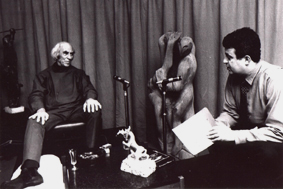THE STONE MIRROR
Return to the Living Time® Docufilms™ Main Page

More About 'In the Stone Mirror'
In the Autumn of 1997, on the day of his 25th birthday, the maker of this film returned to the town where he had been christened with the name of this sculptor. To understand more about the man who, before his death had promised to be a "Guardian Angel" to this infant ("Guardian" the meaning of the name 'Edward'), the young man went to the house that he still had memories of from so long ago and the journey proved to be one of the most eye-opening of his life up to that point.
The film investigates the life and significance of the sculptor Edward Bainbridge Copnall from the point of view of this young man's building fascination with the artist who gave him his own name. We travel to "The Priory" - the studio where Bainbridge-Copnall completed most of his work - and talk with his daughter Jill Neff about the origins and meaning of his work (they over-run the entire place and it is not possible to ignore them). The main room of the house, which is in fact an enormous studio, serves as the central focus of the film, the location from which all the other threads of interest diverge.
To understand the life of this man the film turns to several sources that offer a plethora of unknown information about
the man, above all an unpublished "Autobiography" entitled Cycles. Though an equal to Moore and Epstein in his day, President of the Royal Society of Sculptors and the founder of the Royal Society of Portrait Painters, Bainbridge-Copnall is largely forgotten today and few seem to remember his name or all that he accomplished. On this count the film aims to put the record straight by displaying before the viewer a vast spread of his work. These pieces include: Madonna and Child (Chapel of St.Abbot's in Bromley), RIBA (Portland Place), Sunrise (Adelphi Building), Zodiac Clock (QE1), Mother and Child - Waterloo Bridge, The Black Friar - Near Blackfriar's Bridge, Swanman - Putney Bridge, The Stag - Golders' Green, Thomas à Becket - St. Paul's. These as well as many, many others.